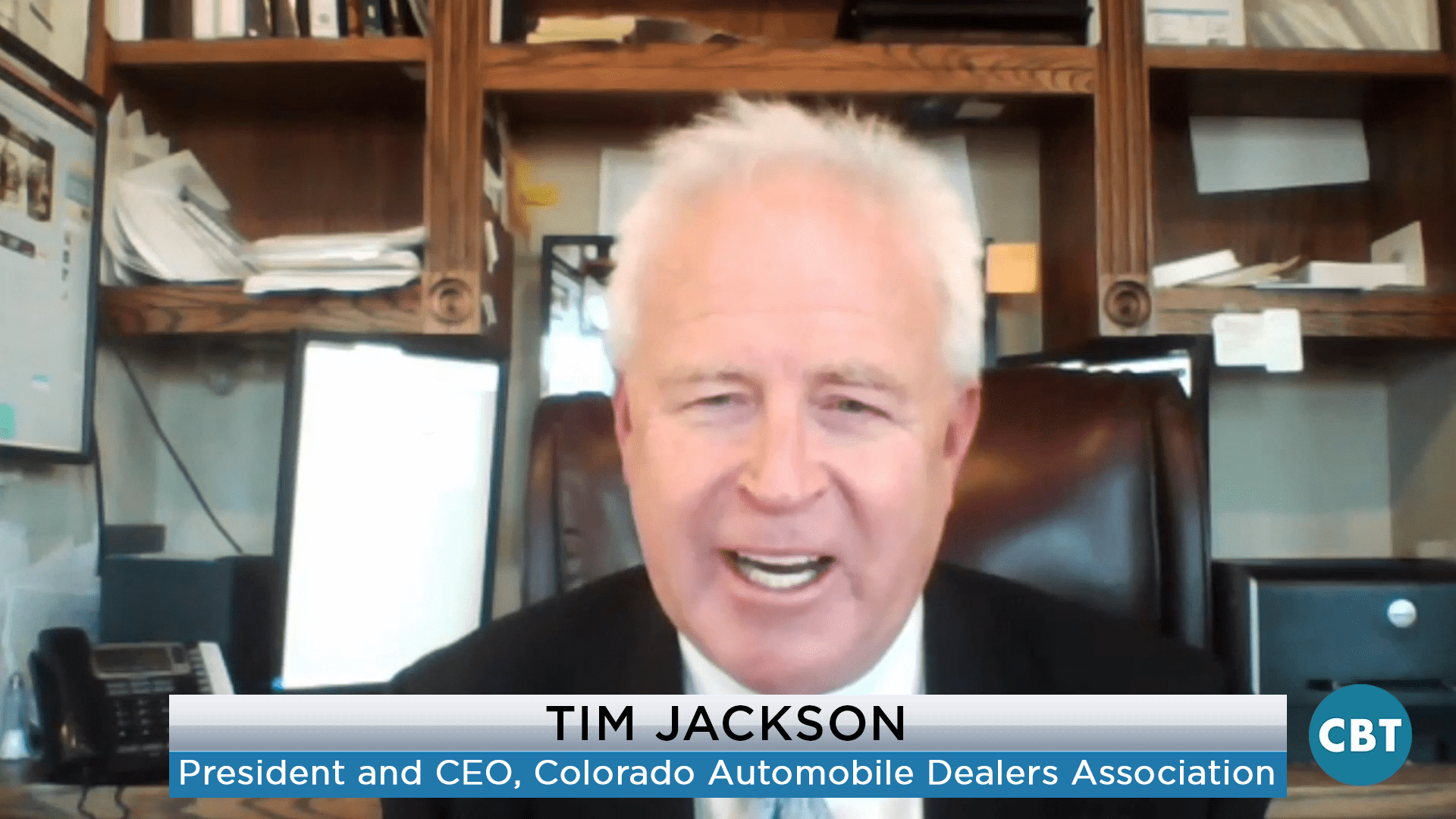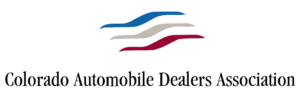There’s been a lot on the agenda for dealer associations to contend with so far this year. On today’s show, we take a look at Jim’s recent conversation with Tim Jackson, president, and CEO of the Colorado Automobile Dealers Association. They discuss Colorado’s fight for lower fuel efficiency standards, warranty reimbursement, and the Innovative Dealer Summit happening later this month.
VIDEO TRANSCRIPTION:
Jim Fitzpatrick: Thanks so much for joining us today, Tim.
Tim Jackson: Thanks Jim. Thanks for the opportunity to be on, and congratulations on everything you’re doing with CBT News.
Jim Fitzpatrick: Well, thank you very much, and it’s been too long. I want to jump right in here though, because you guys have had some wins and you’re fighting the good fight for your dealers out there in Colorado every day. Let’s talk about the suit that the CADA filed against the fuel efficiency standards last year. Where does that stand today?
Tim Jackson: Well, that litigation is in the courts, and what it has to do with is a decision by the Governor here, and a Air Quality Control Commission appointed by the Governor to cede authority for air quality in Colorado to the California Air Resources Board.
This is a board that’s appointed by the California Governor that’s charged with testing and measuring and monitoring and improving air quality in places like Long Beach and LA, San Francisco and Sacramento. They’re not testing air quality in places like Aspen or Telluride or Colorado Springs or Denver.
It’s the first time in history that a state board or commission in Colorado has ceded authority to an out-of-state board or a commission that didn’t have any responsibility for Colorado.
Jim Fitzpatrick: What are you hoping for on that?
Tim Jackson: Well, the litigation is really built around whether or not this board have the authority and went through the proper processes and channels to cede this authority, we don’t believe they do, and that’ll be heard out. This is going to take some time, it will play out over the next year to year and a half before we probably have a decision.
Jim Fitzpatrick: For some of the people that are watching, they may think this sounds like an OEM issue. Is it a dealer issue?
Tim Jackson: Well, ultimately it’s a consumer issue because we conducted a study on it. In this case, the OEMs, the auto manufacturers and the dealers in Colorado and nationwide, are really side by side on this. We’re connected at the hip, and that is, we all favor a national standard, as opposed to a California standard, or 50 different state standards. It just doesn’t make sense to have 50 different, or even two different standards in the country.
What dealers in Colorado, and I believe, and I can’t speak for those outside of Colorado, but dealers, I believe, around the country and the automakers, we all seek a national standard. It can be an aggressive standard, and frankly, we’re under a pretty aggressive standard on the federal level right now.
But ultimately for consumers benefit. What it amounts to is, if it amps up and ramps up too quickly or over aggressively, it’s going to increase the price on new cars and trucks. Ultimately, when the price on new cars and trucks go up, the price on used cars and trucks goes up as well.
We commissioned a study on this, Jim, and you’ll be interested in knowing that according to the study on this particular rule that we’re litigating on, it shows that it would increase the price of the average light duty truck, or full sized passenger car, by over $2,000.
Jim Fitzpatrick: Oh my gosh, wow.
Tim Jackson: So it’s a disincentive.
Tim Jackson: Ultimately, we’re all interested in air quality, and the air quality in Denver and Colorado has improved dramatically over the last 10-15-20 years. But we’re all interested in, and favor improving air quality, but if new car customers can’t afford their next new car or truck that they want or need, they’ll stay in their older, higher omitting car that they’ve got.
Jim Fitzpatrick: That’s a good point.
Tim Jackson: And it’ll actually have an inverse effect on vehicle emissions.
Jim Fitzpatrick: Let’s switch gears a little bit, and talk to us about some of the wins for your association in 2018. One of those being the warranty reimbursement bill, talk to us about that.
Tim Jackson: Well, I’m glad you brought that up, Jim, because that was an important bill, and frankly, a piece of legislation in the Colorado Capitol. It was really modeled after what has happened in some other states. Some other states like Florida, for example, Ohio, even Georgia, Texas, New York, New Jersey and others have taken the lead on this.
But there’s a growing differential. There was a growing differential in what a dealer was reimbursed for, the warranty repairs on a vehicle versus customer pay. If that gap gets too broad, then there’s a disincentive for dealers to take care of the customers for the cars that they sold, that automakers built.
Now, one thing we ought to point out is, new cars and trucks get better every year, year in and year out. And the warranty reimbursement, or the warranty pay in service bays in new car dealerships, continues to go down year in and year out. [inaudible 00:05:38], as a percentage of overall service bay income.
Which is a good thing, that’s great for dealers, it’s great for automakers, and really good for consumers because it’s a testament to the new car quality that gets improved every year. But if there’s a differential there and there’s a wait … So a service writer has, I can get the customer pay in, or I can get the warranty pay in, but it’ll take a 30% or 40% reduction in reimbursement, which you’re then going to be incentivized to bring in. That’s why it’s important.
Tim Jackson: Economically, it had $100 million annual impact in Colorado. Just that differential.
Jim Fitzpatrick: $100 million, oh my gosh.
Tim Jackson: It’s a significant amount.
Jim Fitzpatrick: Talk to us a little bit, if you would, about the need for technicians, speaking about service and warranty. NADA says we’re going to need 75,000 technicians, over the course of the next five years, with technicians that are retiring and such. There’s just an overall need, as you know, that’s been ongoing in the auto industry for the last probably two decades. What do you say about that, and what can dealers do to recruit the right people to their service drives and service bays?
Tim Jackson: That’s an excellent question. Jim, this may surprise you, but I’m going to actually tie into the previous discussion on improving air quality. What we’re doing in Colorado is we’ve created a foundation, a nonprofit foundation called the Clear the Air Foundation, to take old high emitting cars off the road. That actually improves air quality a lot. But we put the revenue from those old high emitters into auto tech scholarships.
In 2018, this association through this nonprofit funded $96,000 worth of auto tech scholarships. Some of those were matching tool tech scholarships, where a student coming out of a trade school and going into a service bay and doesn’t have the tools that they want or need to do the job, and they’re required to have their own tools as you probably know, the hand tools.
We’ve got a deal with Maaco and Snap-on so that they … We contribute $2,500 to Maaco or Snap-on in the name of a student that’s coming out of school. They match it with another $2,500 for a $5,000 grant to that student so can start in the dealership with more than a starter set. That’s a good [crosstalk 00:07:58].
Jim Fitzpatrick: I was going to say, that’ll get you going.
Tim Jackson: But to your original question, the 75,000, I’ve even heard the number 100,000.
Tim Jackson: In Colorado, the dealers we represent and the studies we’ve done, they’re short about six to eight techs per dealership. When you take that times 300 dealerships, we’ve got a huge tech shortage.
Tim Jackson: It’s an issue with trades, and schools in general, that a lot of students coming out of school high don’t realize that they don’t necessarily have to go to college and get a four year degree, or become a doctor or a lawyer to make a good salary, because as you probably know, the good auto techs can pull down a six figure salary.
Jim Fitzpatrick: Easily, yeah.
Tim Jackson: It’s a great vocation to go into.
Tim Jackson: What we’re starting, and what I think you’re seeing through NADA, I was glad to see, and you saw at the NADA show recently in January, there was a huge emphasis on auto techs. But that’s our solution.
Tim Jackson: It’s a little bit different than NADA right now, from a standpoint of the action item, but the cause and effect is all the same. And that’s, we’re looking for a way to get more auto techs into the service bays.
Jim Fitzpatrick: Talk to us about some of the big items on your agenda for 2019.
Tim Jackson: In 2019, we have a new Governor, we have a new legislature, so we’re watching all kinds of new issues at the Colorado Capitol. Colorado was caught up in this blue wave in the election, so we have a lot of new leadership and a new direction of the legislature.
Tim Jackson: One of the things that they are focused on, and it kind of goes with the vehicle emissions, but overall emissions, we’re a gas and oil state. Colorado is the fifth largest producing and exporting state when it comes to gas and oil. But there’s a bill moving through the legislature right now that would really almost shut down the oil and gas industry in Colorado.
Tim Jackson: We’re getting involved a little broader than just the dealer specific issues, because these are Colorado and general public specific issues. There is a movement to green, and again we’re caught up in that wave as well, but we want to do it in a practical way and not, let’s say, overreach. The green new deal on the federal level, would have the automotive and transportation sector with no fossil fuel usage in 12 years.
Tim Jackson: How do you get to that, Jim, when we’re putting out new cars that won’t even be to their average age in 12 years? Does that mean we’re going to park the car in the garage and go out in front and get on a bicycle or a scooter to go to work? Some of this stuff is pretty farfetched.
But we’re caught up in it and that’s our role, is to represent the industry and to represent the dealers. But we’re also in this case, I think, representing consumers because we’re keeping vehicle choice in the marketplace.
Tim Jackson: The consumers that need that light duty truck for their … it might be a small business owner, it might be a family with an SUV going to the mountains for skiing, they need the vehicle of their choice and that’s the fight we’re in today.
Jim Fitzpatrick: Yeah, for sure. Well, that’s a good fight. You’re right in the middle of it, and that’s awesome.
Jim Fitzpatrick: Let’s switch gears once again, and talk to you about this Tesla situation. The notion that they’ll be closing a lot of its stores, most of its stores, and bringing those customers right online to do the complete transaction, choose their car, have it built and have it delivered to them. What’s your take on that?
Tim Jackson: The whole Tesla debate, and by the way, I think it’s probably a wonderful car. I don’t own one, I have driven one. But their distribution model has been in a state of flux since the beginning.
First, there was the effort to go out and build a factory, a factory developed dealer network. So they got all these galleries and salons, some call them, in high end shopping centers all over the country, and literally spending not thousands or tens of thousands, but millions and maybe ultimately billions of dollars in something that they didn’t really need to do.
Elon Musk could have followed the … really the Henry Ford model. Henry Ford figured this out 112 years ago, when he said, “Hey, I’ve got my hands full on building the cars, hiring the people it takes to build the cars, building out that assembly line process.” Now he’s seen, I think, Elon Musk, how much it costs to operate all those retail outlets, so he’s pulling back, doing the online. Here’s the problem with that, Jim. I think consumers want a retail experience.
Jim Fitzpatrick: Yeah, I would agree.
Tim Jackson: When it comes to something as expensive as a car or a home, they want to go to the open house for the home, they want to go to the auto show or the dealer’s showroom for the car, to sit in it, feel it, experience it, drive it. See how it drives and handles, and see if it suits them.
In this case, doing it on the computer, this is a great way to talk to you, but I’m not sure that it’s a great way to buy a $50,000 or $70,000 or $100,000 investment. I think within the next six months to eight months, we’ll see the next 180 degree turn. Because he’ll see, “Oh, I do need a retail experience. I can’t afford it, but the way I can do it and actually improve it is to franchise dealers.” I think he may come full circle. It will have been a painful process for the industry and for the consumers and the drivers and owners of Tesla’s, but ultimately, he might get in the way of the industry.
Jim Fitzpatrick: Sure. Your feeling is, this may be a prelude to him sitting down with franchise dealers and saying, “Okay, uncle. You guys have figured this out over the last 100 years, I haven’t. So let’s work on a plan.”?
Tim Jackson: Yes. In fact, I’ve written an opinion piece on that, and it’s about 900 words. It does actually predict that within the next four to six to eight months, that he’ll come to the realization that the franchise dealer network is the best way to go.
Jim Fitzpatrick: It makes perfect sense now that you think about it, so that’s awesome. I’m not going to let you get out of here without talking to us about your amazing Innovative Dealer Summit, and also the Denver Auto Show. You guys knock the cover off the ball with regard to both of these events, so talk to us about that and what attendees can plan on seeing this year.
Tim Jackson: Well, thanks for that opportunity, Jim. I’ve got to take the opportunity here to talk a little bit about the Denver Auto Show, it actually dates back to 1902. Only those shows in New York City, which started in 1900, and Chicago, which started in 1901, predate Denver’s show.
Tim Jackson: But also this year, and to pick up on a theme we’ve talked about here on auto techs, we have a career fair, an automotive career fair this time with the Denver Auto Show. We’ve teamed up with the Collision Repair Education Foundation, CREF, and we’re organizing an automotive career fair for those auto techs, but other positions in the dealership, and we expect something around 20-30, we even have room for 40 different employers.
So people coming to the auto show, if they think, “Hey, this is a really cool place to be, maybe I want to work in the auto industry,” we’ll have a segue to get them into the auto industry.
Jim Fitzpatrick: That’s phenomenal, that really is. Talk to us about some of the speakers that you’ve got lined up.
Tim Jackson: We have a great lineup of speakers and a great overall show. We’ve also teamed this year with Women in Automotive to help get some of their members from all over the country into this event, and they’ve helped on the speaker lineup.
We have over 40 speakers, 36 different breakout sessions. Some that you’ve had on your show, like Brian up at Paragon Honda.
Jim Fitzpatrick: Oh yeah, Brian Benstock.
Tim Jackson: Yeah, Brian Benstock, and the number one Honda dealer, the number one Acura dealer, he’ll be in for the event.
Tim Jackson: It’s an awesome and tremendous lineup.
Jim Fitzpatrick: I think you have Jim Ziegler as well.
Tim Jackson: Jim Ziegler will be in.
Jim Fitzpatrick: He’s always great to watch.
Tim Jackson: Yeah. His head and his heart is in automotive, and when he bleeds, he bleeds automotive. We’re excited to have him in. And really excited about the overall Innovative Dealer Summit. We have a preview gala, so anybody attending the Innovative Dealer Summit can attend the preview gala and the overall show.
Jim Fitzpatrick: Well, we’re showing right now as we speak, all the information on air. So for those that want to sign up, we’ve got the information for them to do so.
Mr. Tim Jackson, President and CEO of the Colorado Auto Dealers Association, probably one of the best guys in the industry, man. We love you, we love what you’re doing. Your dealers and your members are completely appreciative of the hard work that you and your team do each day out there, and I’m just pleased to have you on CBT.
Tim Jackson: Thanks so much, Jim. It’s been a great opportunity, and thanks for all you do to represent the industry and get the word out.









